STATEHOUSE REPORT | ISSUE 20.41 | OCT. 8, 2021
BIG STORY: Higher percentage of S.C. children get virus, data show
NEWS BRIEFS: On masks, election chief, more
LOWCOUNTRY, Ariail: Columbia rest stop
COMMENTARY, Brack: Getting the vaccine is your responsibility to help your community
SPOTLIGHT: The Felkel Group
FEEDBACK: Send us your thoughts
MYSTERY PHOTO: Another mystery church
Higher percentage of S.C. children get virus, data show

By Andy Brack, editor and publisher | More South Carolina children have or have had COVID-19 than just about anywhere else in the nation, according to two reports.
- An Oct. 4 Washington Post analysis showed South Carolina as having the highest state childhood infection rate, based on Sept. 11 data from the Centers for Disease Control. A chilling chart that compares the infection rate per 100,000 children with vaccination rate shows the Palmetto State as a huge outlier. (See chart.)
- Meanwhile, a Sept. 30 report of state health data showed South Carolina had the second highest total rate of COVID-19 cases among children — 14,996.2 per 100,000 children — of any state other than Tennessee. (See Appendix 3B of the report by the American Association of Pediatrics and Children’s Hospital Association.)
While interpreting data sometimes can be messy, health experts say the bottom line is clear: More kids are getting COVID-19 in South Carolina than other places.
“We do know that South Carolina has seen an increase in pediatric COVID cases and hospitalizations, and that is obviously concerning,” said Derrek Asberry, a spokesman with the S.C. Department of Health and Environmental Control (DHEC). “We strongly encourage everyone ages 12 and up to get vaccinated as soon as possible if you have not already done so.”
What’s behind it all?
Doctors say South Carolina’s numbers are high and the disease is rampant because of a multitude of factors. But if more isn’t done, it’s not going to get better soon.

Dr. Allison Eckard, head of the Medical University of South Carolina’s Division of Pediatric Infectious Diseases, points to three things that make South Carolina a blooming petri dish for the virus — low vaccination rates, complacency and masking policies.
“It has been this trifecta of a low [statewide] vaccination rate as well as people are ‘over’ the idea that COVID is a big deal and, ‘Why should I avoid parties and sleepovers and wear a mask?’ When you combine that with the delta variant, it has spread like wildfire here.”
Eckard added that confusion and controversy about school masking policies haven’t helped in curbing the illness among youths, who returned to school in August as the delta variant surged.
“There is a large group of anti-mask parents in South Carolina who are very aggressive and have frightened many people into submission,” she said.
Earlier this week, a federal appellate judge denied state Attorney General Alan Wilson’s request that South Carolina’s law prohibiting school mask mandates be allowed to take effect.
More numbers
There are a lot of numbers that indicate how big of a problem South Carolina has with COVID-19 among children.
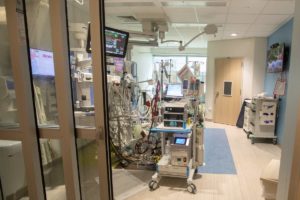
Cases. Almost a quarter of the 872,011 reported cases in South Carolina involve residents under age 21. About 8 percent (67,282) are children who are 10 and under; while 15.4 percent (134,245) are those from 11 to 20, according to the DHEC.
Hospitalizations. Fewer than 700 children under 20 have had to be hospitalized in South Carolina for COVID compared to up to 10 times that number for residents in their 60s, 70s and 80s, according to DHEC. But Eckard says she can tell it’s getting worse for kids. From March 2020 to July, 98 kids were admitted to MUSC for the virus and all but two received traditional treatment. But in August and September, the hospital admitted 74 children, 14 of whom required ventilators.
Deaths. More than 92 percent of South Carolinians who died from COVID-19 — more than 10,000 people — were older than 60, according to state health data. For kids who get the virus, the overwhelming majority bounce back, although 22 have died.
“Something in delta is making more healthy children particularly ill,” Eckart said. “We are seeing more severe cases among children.”
School impact. Health professionals say the delta variant is impacting schools more than earlier versions of the virus. In Charleston County, for example, about 2,800 students got the virus during the 2020-21 school year. But from Aug. 18 through the end of September, more than 2,300 got it, Eckart said.
Statewide since August, some 51,023 students and school staff have had to quarantine after testing positive, while 210,659 needed to isolate for coming into close contact with someone who tested positive, according to DHEC figures.
Get vaccinated, officials say
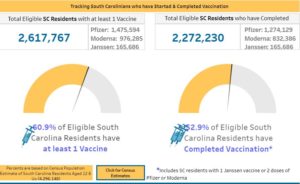
Almost 53 percent of eligible South Carolinians who can get vaccinated are fully vaccinated, according to DHEC. About 61 percent have had at least one shot.
But children between 12 and 17, who couldn’t get vaccinated until early summer, have lower rates. Some 32 percent are fully vaccinated and 41.6 percent have had at least one dose, according to the CDC. Children under 12 can’t get vaccinated yet, but one vaccine maker has asked for federal permission to provide lower-dose shots to children as young as 5.
In a press conference this week, Eckard urged parents to not believe a misconception that children without underlying conditions aren’t at risk of severe infection from COVID-19.
“You cannot always predict who is going to have the most severe type of infection.”
She emphasized the safety of the vaccine.
“Vaccination is the greatest tool in our arsenal,” she said. “I believe in science. I believe in protecting other people. I believe in the vaccine.”
DHEC’s Asberry urged people to get vaccinated.
“Vaccinations protect individuals and their loved ones, including children who are too young to get vaccinated,” he said. “We can beat this pandemic if we all come together as South Carolinians to increase our vaccination rates and mask up while indoors and in public settings.”
- Have a comment? Send to feedback@statehousereport.com
On masks, election chief, more
Staff reports | Some recent news that you need to know:
![]() Federal appeals court keeps S.C. mask mandate ban on hold. The 4th U.S. Circuit Court of Appeals has denied state Attorney General Alan Wilson’s request that South Carolina’s law prohibiting school mask mandates be allowed to take effect while a lawsuit over the COVID-19 pandemic measure goes forward. More: Associated Press, The State, The Post and Courier.
Federal appeals court keeps S.C. mask mandate ban on hold. The 4th U.S. Circuit Court of Appeals has denied state Attorney General Alan Wilson’s request that South Carolina’s law prohibiting school mask mandates be allowed to take effect while a lawsuit over the COVID-19 pandemic measure goes forward. More: Associated Press, The State, The Post and Courier.
S.C. schools to get additional COVID-19 relief funds from feds. South Carolina school districts will have access to $56 million in federal funding to serve vulnerable student populations in the coming weeks. More: The Post and Courier, Greenwood Index-Journal, WCBD TV.
Head of S.C. election agency resigns ahead of schedule. South Carolina Election Commission executive director Marci Andino had planned to step away from her role Dec. 31, but left office on Friday to take over as director of the Elections Infrastructure Information Sharing and Analysis Center, part of the nonprofit Center for Internet Security, according to the election agency. Voter Services director Howard Knabb is taking over the helm in an interim role until a permanent replacement is found. More: AP News.
Murdaugh’s former law firm sues over funds. A lawsuit filed Wednesday claims Alex Murdaugh funneled stolen money from clients and the Peters, Murdaugh, Parker, Eltzroth and Detrick law firm into a fake bank account for years. Murdaugh’s attorney did not offer comment at this time but said his client has “pledged his full cooperation to get these issues resolved.” More: The State/The Hilton Head Island Packet, Hampton County Guardian/The Greenville News, The Post and Courier.
Summey’s company mined Awendaw sand, funds in question. Elliott Summey, former chair of Charleston County Council, has yet to hand over invoices, receipts and truck counts two years after a multi-million-dollar sand-mining project in Awendaw, according to a story in Sunday’s issue of The Post and Courier. The town had hoped the deal would help to create and pay for a lake that would become the centerpiece of a new park. Through an attorney, Summey said he believed his company lived up to its agreement. Summey, who now runs the Charleston International Airport, is son of North Charleston Mayor Keith Summey.
New film explores Orangeburg Confederate flag dispute. Orangeburg native Emily Harrold’s film Meltdown in Dixie is coming to SCETV 6 p.m. Sunday. The film documents the battle over a Confederate flag flying outside of an ice cream shop in Orangeburg. The owner of the shop tried to have the flag removed, which was owned by the Sons of Confederate Veterans Rivers Bridge Camp #842. More: The Orangeburg Times & Democrat.
Charleston falls to No. 2 in travel magazine small-city ranking. Plagued by rising sea levels and a high cost of living, Charleston was replaced by Aspen, Colorado, in Conde Nast Traveler’s latest Reader’s Choice Awards, released Tuesday. More: Charleston City Paper, The State.
- Want more headlines every business day that are like this? Visit our friends at SC Clips.
Columbia rest stop

Cartoonist Robert Ariail always has an interesting take on what’s going on in South Carolina. His weekly “Lowcountry” strip is originally drawn for our sister publication, the Charleston City Paper. Love the cartoon? Hate it? What do you think: feedback@statehousereport.com. Check out the Best of Charleston 2021.
Getting the vaccine is responsibility to help your community
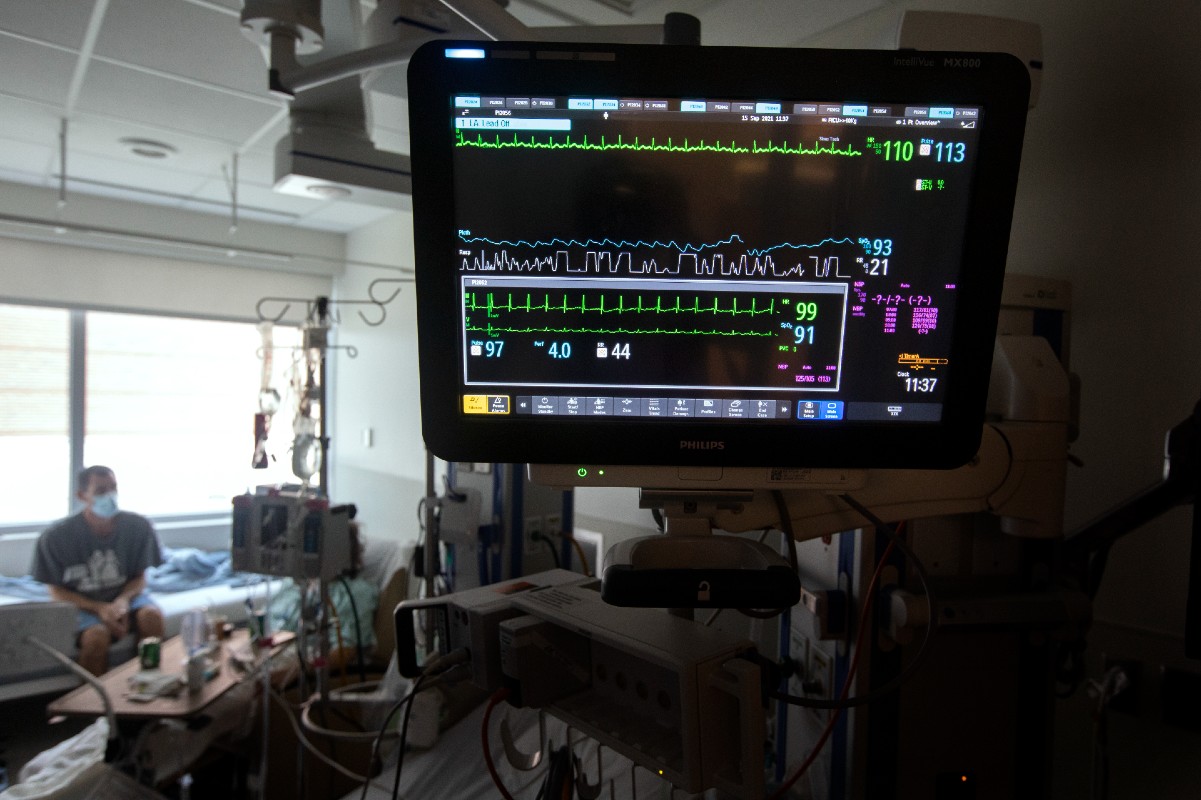
By Andy Brack, editor and publisher | Charter schools, by their very nature, have governing boards made up of parents. They’re publicly funded, which requires them to follow general state education rules and keeps teachers in the state system, but the schools also are independent operationally from county school boards. South Carolina has about 75, which is about 1 percent of the nation’s charter schools.
 When an election for four board seats at one charter school came along, we read questionnaires filed by 10 candidates. They were somewhat interesting, but overall, they seemed pretty vanilla — somewhat informative but bland as reflections of the values of the candidates. The only thing that really was different is one guy filled out answers in all capital letters, which made his answers tough to read.
When an election for four board seats at one charter school came along, we read questionnaires filed by 10 candidates. They were somewhat interesting, but overall, they seemed pretty vanilla — somewhat informative but bland as reflections of the values of the candidates. The only thing that really was different is one guy filled out answers in all capital letters, which made his answers tough to read.
So because the forms included each candidate’s email address, we decided to send a simple question to get a little more perspective:
Q: Are you vaccinated? Yes or no. If you don’t answer the question, I won’t consider voting for you.
Whew, you’d think I was a communist or something.
Six of the candidates freely responded they had been vaccinated. One said it was the easiest question he had received in the relatively quiet world of charter school elections. Another said she’d been vaccinated, but was against vaccine mandates for students, which didn’t make much sense. And another wanted to know why I wanted to know — for personal voting reasons (yes) or to publish people’s answers (no).
Another candidate wanted to know why I wanted to know, but never answered further. Two people didn’t answer.
And then there was this guy — the crank — who attacked:
Him: That is a personal medical question and has absolutely nothing to do with my candidacy. If you are so shallow and partisan as to think answering that question can in any way determine my ability to sit on the board, you my friend, are not the kind of person I am seeking for support.
Me: I obviously disagree. If you do not have a vaccine, you are ignoring science and are not, in my view, qualified to serve on the governing board of a school that needs to encourage students to get vaccinated. Being vaccinated is an investment in the future of our community. Being unvaccinated is an act of selfishness.
Him: Wow, Andy you are so woke! Thank you for your brilliant observations.
Me: (Quoting from his questionnaire): “I can bring fresh ideas. My strength is that my decisions are based in reality.” Reality: 700,000+ COVID cases in SC. 11,000+ deaths.
Actually as of Oct. 7, the picture in South Carolina is bleaker. The confirmed number of cases of COVID-19 was 700,082, but state numbers classified another 171,929 as probable. Deaths totaled 11,141, but another 1,715 are probable. For every 100 COVID tests done, 8.5 are positive — a rate that indicates the virus is still swirling and dangerous in South Carolina, a state with one of the lowest vaccination rates and a don’t-tell-me-to-wear-a-mask syndrome that offers a fertile environment in S.C. for the deadly delta variant of the virus to keep infecting people.
We get it, South Carolina: You don’t like being told what to do. It’s been that way since before Christopher Gadsden developed the “Don’t Tread on Me” flag during the Revolutionary War.
But as a citizen, you have a responsibility beyond yourself to pull together to make your community safe and stronger. Right now, 53 percent of South Carolinians age 12 and over (2.3 million people) have been fully vaccinated and another 8 percent have had one shot, according to state health officials. Imagine how much safer the Palmetto State would be if 80 percent were vaccinated.
Listen to your doctor. Get the shot. It’s safe. It’s effective. And it’s easy.
- Have a comment? Send to: feedback@statehousereport.com.
The Felkel Group
 The public spiritedness of our underwriters allows us to bring Statehouse Report to you at no cost. This week in the underwriter spotlight is The Felkel Group, a battle-tested public affairs and business development firm that assists corporations, associations and not-for-profits that are serious about their long-term success. The Felkel Group solves problems, crafts and delivers messages, helps organizations to manage crisis, and uses a wealth and breadth of valuable relationships to help to seal deals.
The public spiritedness of our underwriters allows us to bring Statehouse Report to you at no cost. This week in the underwriter spotlight is The Felkel Group, a battle-tested public affairs and business development firm that assists corporations, associations and not-for-profits that are serious about their long-term success. The Felkel Group solves problems, crafts and delivers messages, helps organizations to manage crisis, and uses a wealth and breadth of valuable relationships to help to seal deals.
The Felkel Group is also home to an outstanding advocacy tool called The Rap Index, a powerful intelligence tool that employs sophisticated computer modeling and profiling techniques to help organizations find their most effective advocates. To learn more about The Felkel Group and its Rap Index, go to: http://www.felkelgroup.com.
Send us your thoughts
We receive a few comments a week and look forward to publishing. But often we can’t because we can’t verify the identity of the writer. To be published, you’ve got to provide us with contact information so we can verify your letters. Verified letters to the editor are published weekly. We reserve the right to edit for length and clarity. Comments are limited to 250 words or less. Please include your name and contact information.
- Send your letters or comments to: feedback@statehousereport.com
Another mystery church
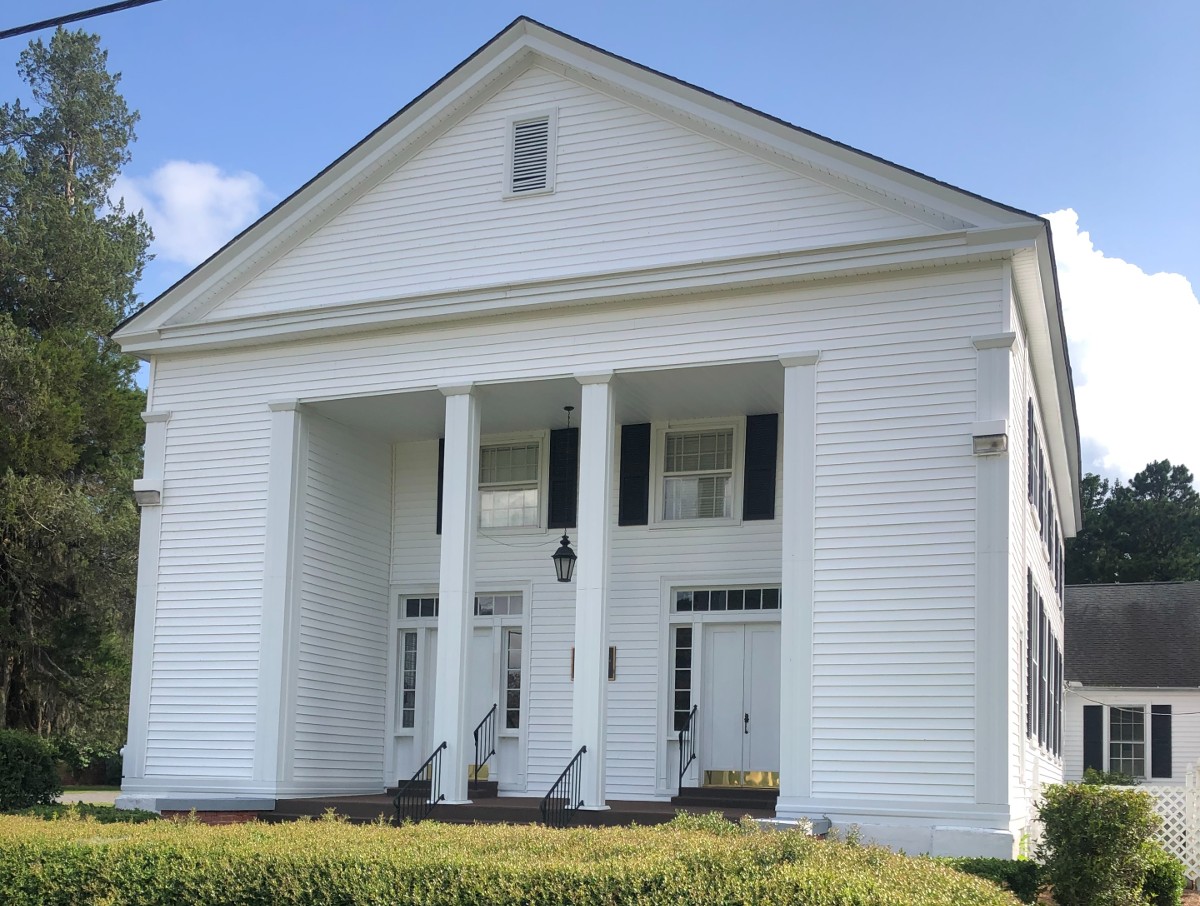
We’re continuing the church theme this week with this beautiful white building sent in by a reader. Where is it? What can you tell us about it? Send your guess to feedback@statehousereport.com — and remember to include your name, home city and contact information.
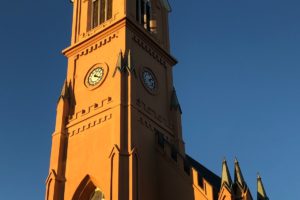 Last week’s mystery, “Orange and blue,” was pretty easy for lots of regular Mystery Photo sleuths. It showed the tall steeple at St. Matthew’s Lutheran Church on King Street in Charleston.
Last week’s mystery, “Orange and blue,” was pretty easy for lots of regular Mystery Photo sleuths. It showed the tall steeple at St. Matthew’s Lutheran Church on King Street in Charleston.
Congrats to these readers who identified it: Faith Line of Anderson; George Graf of Palmyra, Va.; Barry Wingard and Jacie Godfrey, both of Florence; Bill Segars and Don Clark, both of Hartsville; Elizabeth Jones and Jay Altman, both of Columbia; Allan Peel of San Antonio, Texas; David Lupo of Mount Pleasant; Tom Jacobsen of Sitka, Alaska; Curtis Joyner of Charleston; Will Williams of Aiken; and Kevin Mertens of Greenville.
Peel provided some context: Today’s mystery photo is of the clock and bell tower of St. Matthew’s German Evangelical Lutheran Church, just below (but not visible in the photo) the 297-foot-tall steeple. At the time of its construction, the church was the tallest building in South Carolina. It remained the tallest building in the state until it was surpassed by the “Tower at 1301 Gervais,” a high-rise office building in Columbia, S.C. Even today, the church’s steeple remains the tallest spire in Charleston. According to an article in the SC Picture Project here, “In 1965 St. Matthew’s suffered a devastating fire that destroyed the steeple, sending it ‘crashing spectacularly into King Street.’ The church was quickly rebuilt, including the spire, though a section of the spire remains where it landed as a reminder of the event.”
Send us a mystery. If you have a photo that you believe will stump readers, send it along (but make sure to tell us what it is because it may stump us too!) Send to: feedback@statehousereport.com and mark it as a photo submission. Thanks.
ORDER NOW: Copies are in Lowcountry-area bookstores now, but if you can’t swing by, you can order a copy online today.
ABOUT STATEHOUSE REPORT
Statehouse Report, founded in 2001 as a weekly legislative forecast that informs readers about what is going to happen in South Carolina politics and policy, is provided to you at no charge every Friday.
- Editor and publisher: Andy Brack, 843.670.3996
Donate today
We’re proud to offer Statehouse Report for free. For more than a dozen years, we’ve been the go-to place for insightful independent policy and political news and views in the Palmetto State. And we love it as much as you do.
But now, we can use your help. If you’ve been thinking of contributing to Statehouse Report over the years, now would be a great time to contribute as we deal with the crisis. In advance, thank you.
Buy the book
Now you can get a copy of editor and publisher Andy Brack’s We Can Do Better, South Carolina! ($14.99) as a paperback or as a Kindle book ($7.99). . The book of essays offers incisive commentaries by editor and publisher Andy Brack on the American South, the common good, vexing problems for the Palmetto State and interesting South Carolina leaders.
More
- Mailing address: Send inquiries by mail to: P.O. Box 21942, Charleston, SC 29413
- Subscriptions are free: Click to subscribe.
- We hope you’ll keep receiving the great news and information from Statehouse Report, but if you need to unsubscribe, go to the bottom of the weekly email issue and follow the instructions.
- Read our sister publications: Charleston City Paper (every Wednesday) | Charleston Currents (every Monday).
- © 2021, Statehouse Report, a publication of City Paper Publishing, LLC. All rights reserved.
















 We Can Do Better, South Carolina!
We Can Do Better, South Carolina!